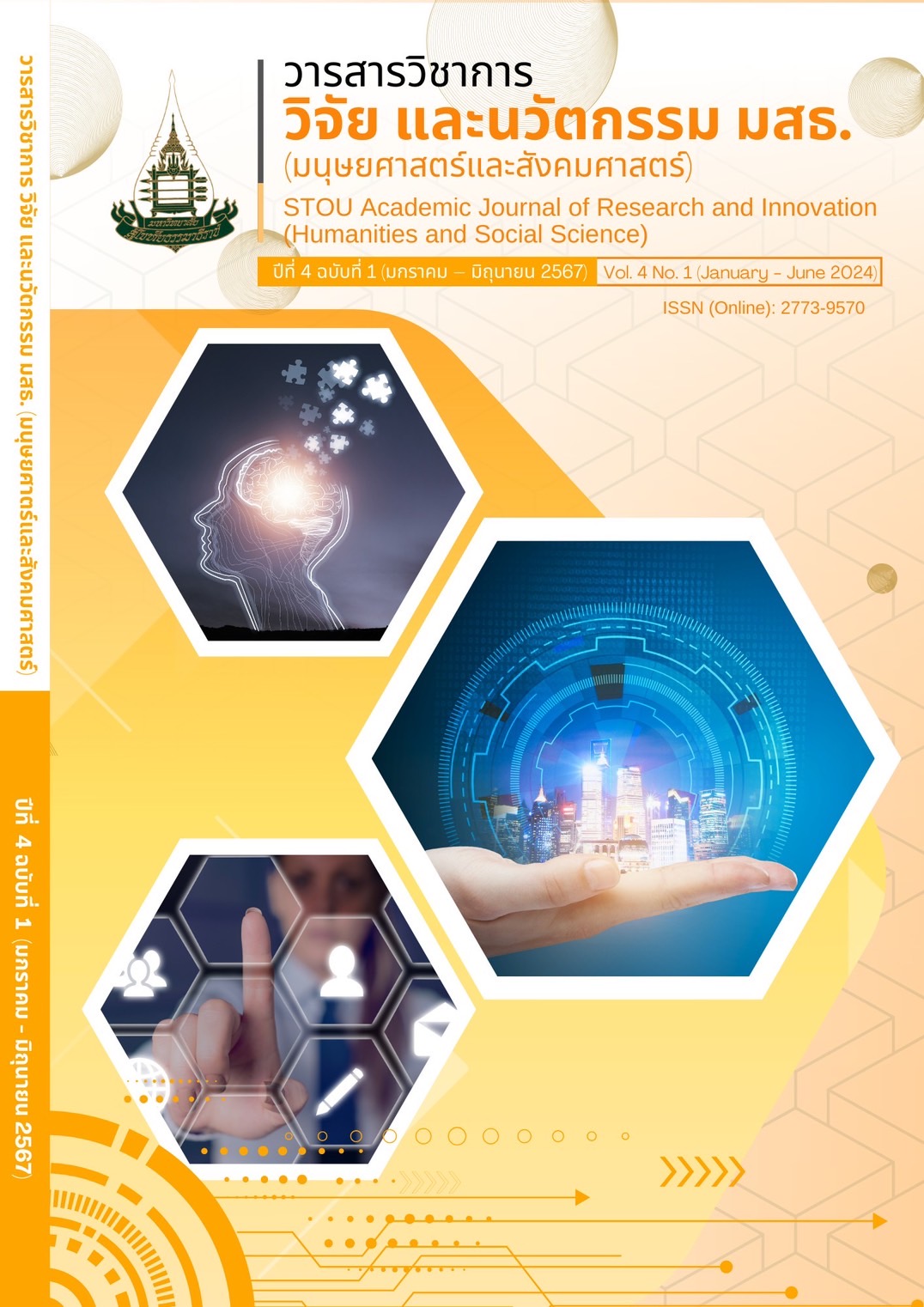Leadership Styles Influencing Police Cadets’ Opinions
Keywords:
leadership, influence, opinions, police cadetsAbstract
The objectives of this research were to study: 1) the generality of directive, supportive, participative, achievement-oriented, and leadership; and 2) the influence of directive, supportive, participative, and achievement-oriented influences on leadership. This was quantitative research. A questionnaire was used to collect data from 113 police cadets. The data were analyzed using hierarchical regression analysis. The results aligned with the research objective, revealing that 1) The majority of police cadets believed that participatory leadership was the most appropriate style, accounting for 59.48 percent. This opinion was grouped alongside achievement-oriented, supportive, and directive leadership styles; and 2) Participative and achievement-oriented Leaders had up to 51.7% influence over the leadership.
References
ฐิติรัตน์ ลีลาเอกนิติ, (2565). การบูรณาการพฤติกรรมผู้นำแบบมุ่งงานและแบบมุ่งสัมพันธ์ในการบริหารสถานศึกษา. วารสารสมาคมพัฒนาวิชาชีพการบริหารการศึกษาแห่งประเทศไทย, 4(3), 51-57.
ตวงสิทธิ์ พรหมมา. (2565). ภาวะผู้นำของผู้บริหารที่ส่งผลต่อประสิทธิผลการบริหารงานโรงเรียน สังกัดสำนักงานเขตพื้นที่การศึกษามัธยมศึกษา นครพนม. (วิทยานิพนธ์ปริญญาคุรุศาสตรมหาบัณฑิต). สาขาการบริหารการศึกษา มหาวิทยาลัยราชภัฏสกลนคร, สกลนคร.
ประเวช รัตนเพียร. (2561). การสำรวจวรรณกรรมลักษณะผู้นำ. วารสารธรรมศาสตร์, 37(1), 43-59.
สิริพัชร งามไตรไร. (2565). ภาวะผู้นำการเปลี่ยนแปลงที่ส่งผลต่อการบริหารงานแบบมุ่งผลสัมฤทธิ์ กรณีศึกษา เทศบาลนครหาดใหญ่ อำเภอหาดใหญ่ จังหวัดสงขลา. (วิทยานิพนธ์ปริญญารัฐประศาสนศาสตร-มหาบัณฑิต). สาขารัฐประศาสนศาสตร์ มหาวิทยาลัยสงขลานครินทร์, สงขลา.
สำนักประกันคุณภาพการศึกษา โรงเรียนนายร้อยตำรวจ. (2566). หลักสูตรรัฐประศาสนศาสตรบัณฑิตสาขาวิชาการตำรวจ หลักสูตรปรับปรุง พ.ศ.2566 โรงเรียนนายร้อยตำรวจ. สืบค้นเมื่อ 12 มกราคม 2567 จาก https://qa.rpca .ac.th/files/1/%สาขาวิชาการตำรวจ%20ปรับปรุง20พ.ศ.2566C HECO.pdf
Adams, B.G., Meyers, M.C., & Sekaja, L. (2019). Positive Leadership: Relationships with Employee Inclusion, Discrimination, and Well-Being. Applied Psychology, 69(4), 1145-1173.
Andersson, S., Granat, L., Brännström, M., & Sandgren, A. (2022). Translation, Cultural Adaptation, and Content Validation of the Palliative Care Self-Efficacy Scale for Use in the Swedish Context. Int J Environ Res Public Health, 19(3), 1143.
Chen, C. (2024) Assessment of Test Validity in the Context of the Duolingo English Test. Open Journal of Modern Linguistics, 14, 1-7.
Cheung, G. W., Cooper-Thomas, H. D., Lau, R. S., & Wang, L. C. (2023). Reporting Reliability, Convergent and Discriminant Validity with Structural Equation Modeling: A Review and Best-practice Recommendations. Asia Pacific Journal of Management, 1-39.
Cronbach, L. J. (1951). Coefficient Alpha and the Internal Structure of Tests. Psychometrika, 16, 297-334.
Farhan, B. Y. (2018). Application of Path-goal Leadership Theory and Learning Theory in a Learning Organization. Journal of Applied Business Research, 34(1), 13-23.
Gutterman, A. S. (2023). Leadership Styles. https://www.researchgate.net/publication/ 373630463_Leadership_Styles
HREX.asia. (2019). Good Leadership. https://th.hrnote.Asia/orgdevelopment/190605-leadership/
House, R. J. (1996). Path-goal theory of leadership: Lessons, legacy, and a reformulated theory. Leadership Quarterly, 7(3), 323-352.
House, R. J., & Mitchell, T. R. (1975). Path goal theory of leadership (pp. 75-67). Faculty of Management Studies, University of Toronto.
Jarantow, S.W., Pisors, & Chiu, M.L. (2023). Introduction to the Use of Linear and Nonlinear Regression Analysis in Quantitative Biological Assays. https://currentprotocols.onlinelibrary.wiley.com/doi/10.1002/cpz1.80
Jain, P., & Luhar, A. (2021). A Literature review on leadership styles and framework. PalArch's Journal of Archaeology of Egypt/Egyptology, 18(08), 3111-3115.
Joo, J., Ju, R., & Song, J. H. (2024). Which Leadership Styles Matter to Subordinates' Knowledge Behavior? Focusing on the Occupational Self-Efficacy and Self-Regulatory Focus. International Journal of Organizational Leadership, 13(1), 39-58.
Lee, H., & Pan, Y. (2021). Evaluation of the nomological validity of cognitive, emotional, and behavioral factors for the measurement of developer experience. Applied sciences, 11(17), 7805.
Marini, J.P., Westrick, P.A., Young, L., Shmueli, D., & Shaw, J.E. (2019). Differential Validity and Prediction of the SAT. Retrieved 7 January, 2024, from https://files.eric.ed.gov/full.pdf
Marini, J. P., Westrick, P. A., Young, L., Ng, H., Shmueli, D., & Shaw, E. J. (2019). Differential Validity and Prediction of the SAT®: Examining First-Year Grades and Retention to the Second Year. College Board.
Masuwai, A., Zulkifli, H., & Hamzah, M. I. (2024). Evaluation of content validity and face validity of secondary school Islamic education teacher self-assessment instrument. Cogent Education, 11(1), 2308410.
Racy, F., Morin, A., & Hagerty, J. (2022). Concurrent Validity and Reliability of Representative Inner Speech Questionnaires. Psychological Reports, 127(3), 56-69
Roebianto, A., Savitri, L., Sriyanto, A.S., & Syaiful, L.A. (2023). Content validity: Definition and procedure of content validation in psychological research. TPM-Testing, 30(1), 5-18.
Ronkko, M., & Cho, E. (2020). An Updated Guideline for Assessing Discriminant Validity. Organizational Research Methods, 25(1), 4-15.
Schuler, J., Anderson, B., & Kusshauer, A. (2023). Test-Retest Reliability in Metric Conjoint Experiments: A New Workflow to Evaluate Confidence in Model Results. Entrepreneurship Theory and Practice, 48(2), 742-757.
Sodikin, M., & Fachrunnisa, O. (2022). A Meta-Synthesis of Research on Achievement-Oriented Leadership Style: Ihsan Values Lens. International Journal of Economic, Management and Accounting, 30(1), 11-24.
Sull, D., & Sull, C. (2018). With goals, FAST beats SMART. MIT Sloan Management Review, 59(4), 1-11.
U.S. Department of Health and Human Services. (2022). The Belmont Report: Ethical Principles and Guidelines for the Protection of Human Subjects of Research. https://www.hhs.gov/ohrp/regulations-and-policy/be mont-report/index.html
Downloads
Published
How to Cite
Issue
Section
License
Copyright (c) 2024 วารสารวิชาการ วิจัย และนวัตกรรม มสธ. (มนุษยศาสตร์และสังคมศาสตร์) (ออนไลน์)

This work is licensed under a Creative Commons Attribution-NonCommercial-NoDerivatives 4.0 International License.





